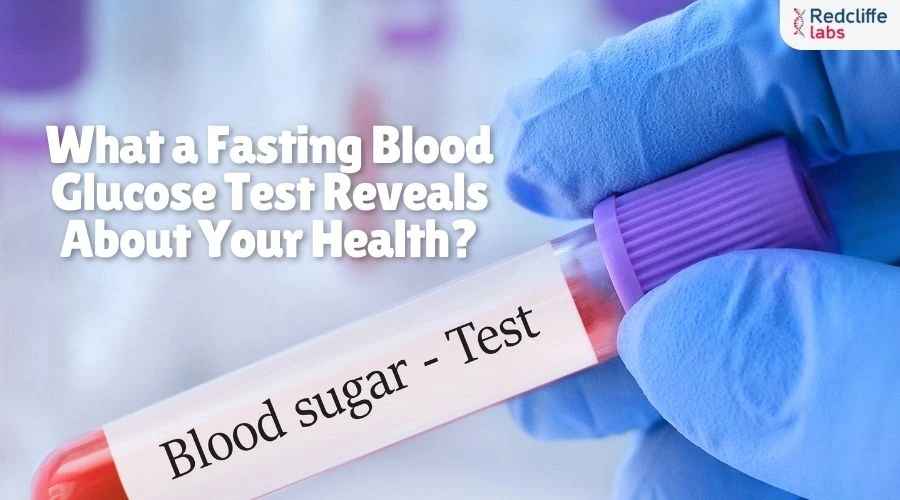What a Fasting Blood Glucose Test Reveals About Your Health?

Medically Reviewed By
Dr. Geetanjali Gupta
Written By Kirti Saxena
on Feb 28, 2025
Last Edit Made By Kirti Saxena
on Jul 19, 2025

A fasting blood sugar test measures the glucose level in the blood after an overnight fast of at least 8 to 12 hours. It is commonly used to screen for and diagnose conditions such as prediabetes and diabetes.
High fasting blood sugar levels may indicate insulin resistance or diabetes, while low levels can result from certain medications. Understanding when to test and what to monitor is important to maintain health, especially for people with diabetes or those at risk of developing diabetes.
Read more to understand fasting blood sugar levels, testing procedures, and tips for maintaining normal levels.
What is a Fasting Blood Sugar Test?
Fasting blood sugar is a common blood test used to detect diabetes, prediabetes, or gestational diabetes (during pregnancy). It's also known as a fasting blood glucose test, and it is done after an overnight fast.
The fasting blood glucose test is performed in the morning. You have to fast for 10-12 hours before the test. The test is done so you do not have to fast throughout the day. It requires you to fast 8 to 12 hours before the test and measures your glucose level after the fasting.
The fasting blood sugar level can be affected by various factors:
-
What was the size/portion of your last meal?
-
The type of food you had consumed as your last meal.
-
How does your body respond to insulin?
These factors might influence your blood sugar levels and help you maintain healthy blood glucose levels.
You May Also Read: https://redcliffelabs.com/myhealth/diabetes/7-tips-for-maintaining-healthy-fasting-glucose-levels-naturally/
Symptoms of Diabetes
Signs and symptoms of diabetes may take time to appear. Therefore, the ADA has set some rules for screening this condition. Here is who should take the fasting blood sugar test:
-
A Body mass index (BMI) of more than 23 or 25
-
A sedentary lifestyle
-
High blood pressure
-
Abnormal levels of PCOS( Polycystic Ovary Syndrome)
-
Family history of diabetes
-
Heart disease
-
A history of gestational diabetes
-
Prediabetes
-
45-year-old or more
How is Diabetes Diagnosed?
Several blood tests help to diagnose diabetes by measuring blood glucose levels. Here are some important blood tests-
-
Glucose Fasting Test- The BSF test measures blood sugar after an overnight fast of at least 8 hours. A fasting blood glucose level of 126 mg or higher indicates diabetes.
-
Oral Glucose Tolerance Test (OGTT): After fasting, a blood sample is taken, followed by a sugary drink. Two hours later, the blood sugar levels are tested. If the two-hour blood glucose level is 200 mg/dl, it indicates diabetes.
-
HbA1C Test: This measures your average blood glucose (sugar) levels over the past two to three months. The normal HbA1c level is below 5.7%, 5.7% to 6.4%, which suggests prediabetes and diabetes if it is 6.5% or higher.
-
Glucose Random Test- This test measures blood sugar without regard to when you last ate. A random blood glucose level of 200 mg/dL or higher shows diabetes, like increased thirst and frequent urination, indicates diabetes.
However, with early detection and regular diabetes testing, you can prevent complications associated with diabetes. If you experience symptoms or have risk factors, consult a healthcare provider.
How to prepare for a fasting blood sugar test?
Unlike other blood tests, the fasting blood sugar test preparation is simple: You should not eat or drink for 8 to 12 hours before the test. You should also not take any medications before the test; if you do, consult your doctor before the test.
What can I expect during the test?
A fasting blood glucose test is a blood test. A phlebotomist first checks the appropriate vein and cleans it with an alcohol-based solution. Then, he uses a needle to draw blood from a vein in your arm. After the test, he sends the blood sample to a lab for testing.
What does the Fasting Glucose Test Indicate?
A fasting blood sugar test measures your blood glucose level after an overnight fast of at least 8 hours. The results help determine how effectively your body manages blood sugar. Here's what the test reports indicate-
-
Normal- Less than 100 mg/dL.
-
Prediabetes- 100 to 125 mg/dL. This range indicates impaired fasting glucose, suggesting a higher risk of developing type 2 diabetes.
-
Diabetes- 126 mg/dL or higher levels suggests diabetes.
Suppose your fasting blood sugar test results are abnormal. In that case, your healthcare provider may recommend additional blood tests, including HbA1C or oral glucose tolerance test (OGTT), to confirm the diagnosis and assess your average blood sugar levels over time.
Early detection and management of abnormal blood sugar levels are crucial in preventing complications associated with diabetes. If you have concerns about your blood sugar levels or risk factors for diabetes, consult your doctor.
FAQ's
Can I drink water before the fasting sugar test?
Yes, you can drink only water before the fasting blood sugar test.
Why is fasting glucose high in the morning?
If your fasting blood sugar is as high as 126 mg/dL, then you should consult your doctor as you might have diabetes.
What is the normal blood sugar level after fasting?
The normal blood sugar level should be 100 mg/dL after fasting.
Does caffeine affect blood sugar?
Yes, caffeine affects blood sugar levels. Caffeine can cause higher or lower blood sugar levels.



